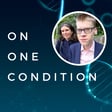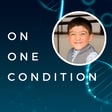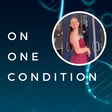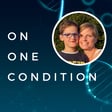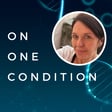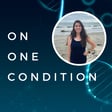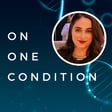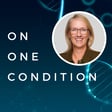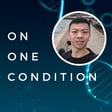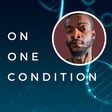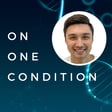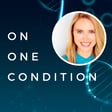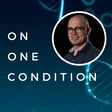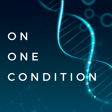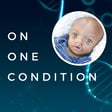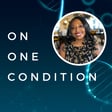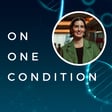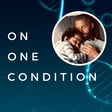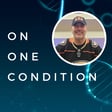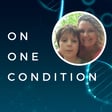Become a Creator today!Start creating today - Share your story with the world!
Start for free
00:00:00
00:00:01

Episode 52: Chris Velona - Batten Disease CLN8
Chris shares the profound journey of raising his son, Sebastian, who has Batten disease CLN8. He reflects on the bittersweet experiences of witnessing Sebastian’s once-vibrant abilities erode under the weight of this rare, degenerative condition. Chris shares his constant search for new therapies that can help reduce the frequency of his son's seizures. We also talk about his fund-raising for clinical research and the lack of appetite from pharmaceutical companies to treat his son's rare condition.
The song that Chris chose is Tiny Dancer by Elton John.
Transcript
Introduction to 'On One Condition' Podcast
00:00:00
Speaker
Hi, I'm Sylvain Bertolo, and you're listening to On One Condition, a podcast to raise awareness about health conditions by listening to people who leave them every day.
Chris Verona's Story: Battling Batten Disease
00:00:10
Speaker
My guest today is Chris Verona, and we're going to talk about his son, Sebastian, and pattern disease, CRNA. Hi, Chris. Great to have you on the podcast. How are you doing today? I'm doing great. Thank you for having me.
00:00:28
Speaker
Well, it's a pleasure. And as I'm sure you know, I love starting with a song. So could you tell us which song you chose and why? Probably Tiny Dancer by Elton John.
00:00:41
Speaker
And for that reason is because my ex-wife's favorite band in the world is Elton John or one of them. ah And that was a song that she and my son Sebastian danced at this event. And I just have this really great memory of that. That's nice. and I like that song. it's Yeah, it's a good one.
00:01:13
Speaker
Not that you didn't make approval, but still.
Sebastian's Early Years and First Seizure
00:01:18
Speaker
So today we're talking about your son Sebastian. Where does it make sense to start? Should we start at the beginning when you ah were aware that ah Sebastian had pattern disease? or I mean, you know,
00:01:36
Speaker
the storyline is like at birth and you know, you, you think you have a healthy baby and there's nothing wrong. And, uh, this was before like the additional newborn screening tests were added. And so you just, you, you basically tested for all the the basics and, uh, you know, he was clear and this is like,
00:02:04
Speaker
about, I don't know, about a year after our first miscarriage. And so it was scary to say the least, but easy birth, no complications during the pregnancy and um came out beautiful, blonde hair, blue eyes, and just awesome. And no issues whatsoever. Two years later, his brother Gage joined him.
00:02:33
Speaker
It was more ah like bright red hair and blue eyes, um being that my side of the family is Italian-Irish. And my ex-wife Terry's more like a European milkshake, a lot of different countries, Sweden, Austria, and whatnot. But um nothing was really you know going on until the age of five when he had his first seizure.
00:03:00
Speaker
Meaning that he was, you know, doing well. He was passing all his milestones, no issues, not even a hint of any type of an illness until he had that first seizure. That was on, it our family vacation trip in Hawaii. Wow. How, how do you react to a seizure? That must be scary.
00:03:26
Speaker
Well, if you don't know what it is, you're freaking out you know because you don't know what to do. it, you know, now it's just like breathing. I know what to do. I expected it. It's a daily occurrence at times. But that first one is like, shocking. It's scary. ah So you know, you don't know what to do. You know, you're, you're trying to stop the shaking, you're screaming at him, wake up, wake up, and then the turning blue, you can't breathe. You don't know if he's choking or not, you don't have any training.
00:04:01
Speaker
And it's scary. It was very scary. We were on the 14th floor of this hotel. And we were going to our room and it had been a long day. Of course, excitement of traveling to Hawaiian islands. There was no sleep the night before, you know, you get up and you're rushing to the airport and there's no food and you're not really drinking anything. You're excited and you're not sleeping. And and so when you get there, you're, you're told that your hotel room is not ready. And you have to wait another couple hours. You can go downstairs and we, uh, you know, to figure out if we're going to eat or whatnot. We just want to relax. And so we all went in the hot tub. So having a hot tub on an empty stomach with no sleep and felt great. But we were actually inviting later to be found out at Maui General, a fibral seizure.
00:04:58
Speaker
This seizure was you know classified as ephemeral. As you know, what I just described to you guys, they just you know anybody would say, oh yeah, you invited that. yeah But i I think that the the catalyst was already set with his his genetics. And there always needs to be some sort of event. For that event, that had to be Sebastian having a seizure.
00:05:23
Speaker
You know, scared, running with him in my arms, helped me, helped me, helped me into the the lobby. I went finally. And there was a there was an ambulance that was just packing up. There had been another person that needed attention and the EMT rushed to me and took my child out of my hands. and basically did some sort of maneuver on his back and he threw up all this chocolate milk and he covered the ah the a the the the medical professional and he came to and he was able to breathe okay and then and we told him what I had saw and so basically we just rushed over to Maui General just to check him out.
00:06:06
Speaker
We were able to stay the rest of the vacation and had some great memories and like nothing happened.
Managing Seizures and Misdiagnosis Challenges
00:06:11
Speaker
It was just insane. So I think we'll come back to to Sebastian's diagnosis. But because we're talking about seizures, you said that at times it can be daily. Is that is there any signs or that do you know that there they're coming? And is there any a risk of long lasting impact on Sebastian?
00:06:39
Speaker
Yeah, seizures suck and they are detrimental. Now, what I will tell you is that the the seizures don't kill the patient. It's the fall or it's the suffocation or it's the trauma to the body. Do you know if they're coming? I don't. The patient usually does. And Sebastian, with his limited capabilities of of communicating,
00:07:03
Speaker
Even in the beginning of it, he was misdiagnosed with just having epilepsy. Uh, but later on, all these other things started happening and loss of vision, uh, loss of fine motor skills, not able to walk. And, uh, pretty athletic up until that time. But if, if you're asking me, how do I know it's not that I know anything, it's just that I follow, you know, basic guidelines. So they are basically.
00:07:32
Speaker
Is there enough water in the body? Are you hydrated? Did you eat today? ah Did you get rest today? Are you sick? Do you have a fever? Are you stressed out? um Are you upset?
00:07:48
Speaker
All these things can can yeah invite a seizure to our bodies. And unfortunately with Sebastian's condition, you know we used to think that he was a little bit immune compromised. So there was a lot of precautions around if you were sick and he got sick from you, he would have a seizure. That that was kind of like the tell side was how. There's a lot of different things you can put into, I guess,
00:08:18
Speaker
Planning but it was like. What i did is a newborn father you know when you when you have children you have this baby bag right you take that baby bag everywhere you go in the car to your friend's house and inside that bag of the essentials for the day right diapers food milk formula so i decided that it was gonna happen every day so every day i'm prepared.
00:08:43
Speaker
and And instead of the diaper bag, I have now rescue meds everywhere I go, which is to help bring out the the patient out of a very long term seizure, which Sebastian's had seizures lasting up to four or five minutes at a time. So basically, that vigilance never dies, even at age 21.
00:09:03
Speaker
because he's not able to care for himself. He's still somewhat incapacitated. So it's it's it's a daily thing. Wherever he goes, he has a rescue mat on him, whether it's in his backpack for his wheelchair, whether it's on the school bus, whether it's in the classroom, whether it's in the nurse's office, as well as here in the house. So it's a monumental undertaking just to have epilepsy.
00:09:27
Speaker
with a rare disease child who is not able to communicate that aura, as they say, the warning. I've talked to quite a few people in this world, and they know it's coming. They just sit down. They know it's coming. They get safe. And I ask them, why do you do that? And they say, well, because I don't want to hurt myself. I don't want to you know die. I don't want to have head trauma. I just immediately stop what I'm doing or I pull over on the side of the road and I wait.
00:09:56
Speaker
Sebastian doesn't have that ability to tell us. yeah Well, you've listed a lot of different symptoms, epi epilepsy, loss of vision, loss of motor skills. So between that first seizure, ah you also mentioned a diagnosis of epilepsy. So what was then the path to get the the right diagnosis of pattern disease?
00:10:24
Speaker
Yeah, sure. We just rolled with that that first diagnosis. The doctor in Maui said, hey, when you get home, talk to your your general practitioner. And then after that, you know you'll know a plan. We had to pause the recording for a few moments as Chris received a phone call from school. Sorry about that. As you would guess, that's the school calling to tell me he has a seizure.
00:10:51
Speaker
So I mean, these this is the the the day in the life. I mean, that that's the thing i I was trying to convey to you, just it's gonna happen. And I have people in place, thank God, that actually respect the the the seriousness of of that illness. But that's just purely, epilepsy is just merely a symptom of CLN8 for Batten disease. As all Batten kids have epilepsy,
00:11:20
Speaker
um and You asked me, you know how do we know? it as As the child continues to deteriorate, you you start to think, this is not epilepsy. Epilepsy is just seizures. It doesn't come with blindness or fine motor skill loss or are they able to not talk?
00:11:39
Speaker
you know so we had an opportunity to go to a neurologist and he was ah he wasn't the best at bedside manner. He was just angry and angry like an old man angry. He just thought that we were overzealous and these you know these you we were we were new parents and basically dismissed us. and He said, if you have another one, come back and see me and then we'll we'll mix up a cocktail of drugs and we'll he'll be fine.
00:12:07
Speaker
And I was like, I don't want to ever see this guy again. All he wants to do is drug up kids. And then he had another one, and then another one. So we had a referral to UCLA. And that started this journey of of of um somebody in neurology saying, yeah, this is not just epilepsy. We need to genetically test him. We want to find out why. And so we did. We ah genetically tested Sebastian.
00:12:33
Speaker
And unfortunately we were given this wonderful disease called Batten disease and his variant is CLN8 and there are 14 different known variants and so you need 14 different cures. Why? Because everything is genetic.
00:12:51
Speaker
And it's it's very challenging because you can share information between variants, but you can't really utilize the treatments. ah There's only ah like two or three variants that actually can share ah treatments such as enzyme replacement therapy at this time.
Exploring Therapies and Alternative Treatments
00:13:08
Speaker
But there are no cures for baton disease and probably won't be for a very long time.
00:13:14
Speaker
Okay. I yeah assume that you've gone down the road of trying to find a treatment then and is there nothing at all that that can make Sebastian feel better or slow down his progression? you know In the beginning, you know gene therapy replacement was going to be the end of all cures.
00:13:38
Speaker
or and all illnesses rather, it was going to be the ultimate one cure for everything. And so there was ah a couple of people rushing towards that and spending a lot of time and a lot of hours and tens of millions of dollars, but yet it hasn't really shown up.
00:13:56
Speaker
So you try to do all these other types of therapies. So for Sebastian, ah since we couldn't do enzyme replacement therapy, we had to figure out a way to what do we do?
00:14:11
Speaker
And so we went into physical therapy to strengthen his legs and to ah keep him stretched. We went into different types of diets to counter the the epilepsy, which is very hard. The ketogenic diet is great, but it's very hard for children.
00:14:28
Speaker
you know because its just Tastes awful. you know um We went into swim therapy to keep his body you know strong. We started to do different homeopathic modalities and such as PMF beds. There was the newbie at this other chiropractor which attaches to the vagus nerve. So all these these electronic stimulations which really help for a while, you know they really helped the body for a long time. It helped them run again, these modalities. ah But the baton disease, is just ah it's just a monster. So it just it really fights back. And so years of trying to get into clinical trials, we as a family raising millions of dollars only need to be told
00:15:14
Speaker
Your variant is super ultra rare. There's like maybe ah you know not even 10 of you worldwide. So we're not going to take you on. We're not going to help you. and you know Two major pharmaceutical giants that bought the rights to the research that we paid for that we conducted in Ohio was just left on the shelf because they they couldn't monetize some sort of effective manner to make money.
00:15:42
Speaker
And so I basically it was very disappointed, very upset and then didn't understand. up until that time, why wouldn't you help us? you know Whatever happened to saving lives over making money, but the world runs on money. And I just decided I was gonna step back and try to search for different types of nutrition, different types of purging, different types of ways to get that toxicity out of his brain, because he doesn't have an enzyme that removes all of the toxic synapses
00:16:18
Speaker
out of his body. So whenever we're doing something like with my hands or blinking, the synapses that tell the brain to move the body, there's like a puff of toxic smoke that is there. And if it's not removed, it will it will it'll sit there and destroy the healthy cells. So that enzyme comes in behind and grabs it and basically excretes it through your normal waste.
00:16:41
Speaker
And ah Sebastian doesn't have that. And so I've been just looking around and and talking to different types of people ah in the homeopathics. And so we right now, we are currently doing EE systems about 30 hours a week.
00:17:01
Speaker
And what that is, is that you just sit there in front of different television monitors with different frequency healing using scalar wave technology. And that seems to be very helpful at this point in time. How does that work? Because I saw some pictures on LinkedIn that you posted. I can't picture the correlation between the screens and the brain. I wish I knew exactly how it works, brother. But all I can tell you is that.
00:17:30
Speaker
What it does is it these different frequencies, it basically heals the body within by charging the mitochondria in our bodies. Now the mitochondria is the is the main power plant of everything in our bodies. People think it's the heart. That's just part of one component. If you charge that mitochondria and it it is a powerful tool, everything else is just ready to go. It works over time. And what we've seen with Sebastian at this point is,
00:18:00
Speaker
less seizures, a happier kid, a happier adult. He's able to talk more. He's able to walk more. He's eating everything in sight. you know Unfortunately, I have to go soon. We just had a seizure, but you know these are the things that that I'm learning as I go, and I'll take it. Instead of waiting around for medicine to do something, which I don't think they'll ever do,
00:18:26
Speaker
I'm just trying different things and what was once multiple seizures in a day for almost six months out of nowhere because we what what you what you don't know is that basically you have a tremendous amount of seizure activity. Then you get on medication and then it slows it down and then your body gets used to that medication and then all of a sudden you could try a new medication which could spike more seizures or reduce them. so It's like you know up and down every day, every month.
00:18:57
Speaker
and so This last summer, last two years of these summers, I don't know what's going on, but you know he's had a tremendous amount of activity to where we have different types of seizure activity ah throughout the day. So my last seizure was October 8th and today is October 14th.
Funding Research and Pharmaceutical Struggles
00:19:20
Speaker
So not bad using this type of ah therapy in my opinion.
00:19:25
Speaker
Well, yeah, that's a big difference to a seizure a day. Chris had to leave to pick Sebastian from school and look after him. We recorded the rest of the podcast a few days later.
00:19:42
Speaker
Right, so Chris, we've talked about the type of treatment or therapies or diets you've tried for for Sebastian with the system which is quite promising. Now I'd like to go back to something you mentioned in passing which is about funding.
00:20:05
Speaker
And a therapy or a treatment that you tested, if I understand correctly, but that's now left on the shelf, is that right? The the gene therapy program um is really still in a mode of like continually trying to figure it out. I believe that there's only been one variant, CNL6, that actually has dosed these children with new genetics. And it's kind of like in in when I'm realizing it's just hit or miss, like some kids respond well and some kids don't. And even since the inception or the the dosage the dosing,
00:20:52
Speaker
ah kids have died, the ones that have been dosed. So, I still think they're in that situation where they're trying to figure it out, but that is the only variant that I know. And I'm happy that these things are happening. Of course, I'm not happy that these children are not getting well from ah the introduction of new genetics, but I'm happy that yeah know the that these people were actually given the opportunity to have lifesaving you know potentially life-saving measures, as well as the data would show that, hey, we can improve on it. you know But did I and to understand correctly that you like personally he did some funding for some clinical trial?
00:21:38
Speaker
Oh yeah, we, we as a family, we, uh, we fundraised over, I think a couple of million dollars between my ex-wife and I to fund these trials and keep the science people working through preclinical data.
00:21:56
Speaker
which is you know you're setting up your You're setting up your experiment. You're you're you're getting samples. You're creating ah different pathways for the injection sites or or how you're going to transport the virus into the body. so These things take money and time. so We were funding the scientists moving forward and into in into that preclinical trial phase.
00:22:21
Speaker
and And once we got to the point where we were ready to go into the next phase, the research was was ah was sold or bought out to big pharma. And then you you completely lost control.
00:22:38
Speaker
Well, you don't, you don't have any control. I mean, you go from, you go from six or seven people in a lab to like, you know, 50 to a hundred people in a lab. You're dealing not with fundraising anymore, but you're dealing with billions of dollars in pharmaceutical, gigantic money. And then they tell you that, Hey, we've, we're going to take it from here. We're going to save your kids. We're going to take care of you. We're going to refund all your money.
00:23:05
Speaker
You're going to sign NDAs and we're basically going to control you and everything and everything that you say. And in return, we'll potentially save your life.
00:23:16
Speaker
So you you say yes, of course, because you got nothing else going on. And then this is what you want. You want someone with deep pockets that is in this field that knows what they're doing. Not that these ladies, these gentlemen that were doing the preclinical trials, they didn't know what they're doing. But when you have that kind of money, you have access to better equipment, better resources, better materials. Yeah. Yeah. And did it lead to clinical trials then? No, it did not.
00:23:46
Speaker
It did not. it It led to a lot of lies, a lot of being put off, not returning phone calls, emails. and I think about into like the fifth, sixth month, we were just kind of like, what's going on? and Instead of having these you know meetings that were centered around patient engagement, it was more like, we're not going to talk to the patients.
00:24:12
Speaker
You know, because you have multiple families, multiple children, multiple variants that this company purchased their rights to, or I would have to say that the hospital sold the licensing agreement from the hospital to the pharmaceutical giant. And what what happened was I think that they bought or was able to acquire, you know, out of that whole saying of FOMO.
00:24:39
Speaker
fear of missing out, you know, gene, gene therapy and and the techniques and the technologies one day will be the future of medicine. I still believe that. But you know, when you have companies racing to get that type of, uh, of, I dunno, foothold in the marketplace and you find desperation within the families, you buy it, not thinking, Hey, we're going to make money or not. We're just going to buy it.
00:25:07
Speaker
And I think that's exactly what this company did. Could they have done it? Yes. Did they spend money on research? Yes. Did they move the needle? Not very much. I think they found out that there was no way to make money off of baton disease. They basically shelved the whole program and then just, you know, decided not to deal with the families. And in the exit interview,
00:25:36
Speaker
for them to finally get back to us after not talking to us for 18 months. And not just us, but just multiple families. They basically said, they said it out loud. There's no way to monetize your son's illness. There's no way to monetize these other children's illnesses. There's too few of you. We made a mistake and we're done. So good luck. Of course you can understand that the but devastation and the anger and the resentment, and once again, that fear comes back and it's just all anger.
00:26:06
Speaker
So yeah, that that's that's what happened. So we were left holding the bag. I still have not gotten my rights back from the CNL8, from all the data. It keeps getting like being put off again. Why these hospitals who got the the acquisition back to the data, why they won't talk to me anymore, probably because I was pissed and I was angry as a father. I would like to continue the research and not have to start from scratch.
00:26:36
Speaker
but I might have to, you know, because it's like, uh, it's like the data is like a football that keeps going back and forth. And it should be in the rightful hands of the, of the families who paid for him with the beginning. So it's very frustrating. The thing that's disgusting is that these people that have the ability, they have the knowledge, they have the money to do stuff and they choose money and profit over life.
00:27:03
Speaker
Now I understand business, you need money to make money, I get all that stuff, I really do. But when you're telling people that I could save your child and I'm worth over five billion, and you're in that sector of ah creating either its ah medicine or vaccines, you pretty much believe them. And we believe the lies. And the lies were based on how much money could they make.
00:27:30
Speaker
And when they realized that they couldn't make any money, they dumped us. Now, this happens all the time. It's just not in baton disease. This happens all the time. The FDA, in my opinion, is corrupt. The lobbyists are corrupt. ah These pharmaceutical people and companies are corrupt.
Shifting Focus: Quality of Life Enhancements
00:27:50
Speaker
It's all about money. It's not about saving lives anymore.
00:27:55
Speaker
Well, that's difficult to hear. That's difficult to hear. It's heartbreaking. I'm in the industry because I believe in what we do and because I ah think it does save lives. But obviously, like what you said, it has to to make money and it's not just about saving those lives.
00:28:24
Speaker
And it's frustrating to hear your experience. And I completely understand why you have the anger and the frustration and how painful it must be to not be able to access access your data and carry on with the research. I wonder what that is. Well.
00:28:45
Speaker
I can imagine how difficult it is to talk to the right person and then to get answers from the right person. So completely empathize with your situation. At a certain point, so and you you you have to figure out what's in your heart. What do you want to do? You can't keep chasing cures because you'll end up dead. So quality quality of life becomes a very huge issue.
00:29:14
Speaker
Whereas the cures and the treatments were supposed to produce quality of life, right? Now you've been told you're not going to get any of that. There's nothing we can do for you. Good luck. You better spend time with your kid. So now it's all about quality of life. And so while I was in that, that sphere for about six months, that depression, I have now torn, turned towards more.
00:29:38
Speaker
alternative medicines, you know stepping away from Western medicine, looking at Eastern practices, looking at more homeopathics. And um we have found a couple of different modalities that are actually creating that quality of life. No treatments or cures per se, but a quality of life ah through these these different types of of ah practices that has actually made a difference in our son's life.
00:30:09
Speaker
And so what's the prognosis for Sebastian? Prognosis for Sebastian is he's supposed to be dead twice. I know what that sounds like. I know it sounds morbid, but it's true. When we first got di-, well, the first misdiagnosis was under the banner of epilepsy.
00:30:27
Speaker
The second diagnosis was Batten disease after doing genetic ah testing. So they said that you know at the age of six, when seven years old, eight years old, you know he wasn't supposed to live. He wasn't supposed to live into his teens and he'll be dead definitely before his 21st birthday. Well, he's going to be 22 in the summer. So there is really no prognosis. You can sit there and follow this model of what Batten disease does.
00:30:56
Speaker
whether it's at birth or juvenile or late onset. I think it's the quality of the care. I think it's the the amount of determination, the amount of love, patience, fortitude. That's how you really need to look at these kids. And it takes it takes a village. It takes a strong set of parents or a single parent in my case.
00:31:24
Speaker
and As you said earlier on, the mother's nonexistent. She's not really around. So it's been me and my team. Thank God I live in a state that offers a lot of help ah to special needs families. um We have a great support system here through a part of the government that I actually like.
00:31:44
Speaker
which actually uses state-funded tax dollars and and ballot measures to help fund these families like mine to get basically the daily necessities that you need to stay alive and stay in a house and stay safe. Overall, it's it's it's about how you you have a relationship with the patient, your son, your daughter, your you're your brother, your sister.
Support and Reflection on the Journey
00:32:07
Speaker
you know if If you're positive, then they're going to be positive, and that's the best medicine, I believe.
00:32:14
Speaker
yeah yeah What kind of support do you get? I get support through Regional Center here in Los Angeles, which basically sets us up to have in-home nursing or respite, which is somebody comes in and provides a break for the caregiver. I'm a full-time 24-7 caregiver. I'm on the clock.
00:32:37
Speaker
Every day for about 20 hours a day, the other two hours I'm sleeping while my other nurses are here to give us breaks. Another great facet of that is called in-home supportive services where they actually pay us as caregivers a fair wage so that you can stay home and take care of your child.
00:32:58
Speaker
if he's not constantly in the hospital. So people in this space know that if you're a full-time caregiver dealing with rare disease or special needs children, you can't have a normal job. You can't go work 40, 60 hours a week and bring home the bacon because that child needs you 24 seven, whether it's going to be ah due to seizures,
00:33:18
Speaker
or medical conflict or doctor's offices or hospital visits. So both parents, if they are together, what the usual duality of that marriage is is that one works full time, the other one works full time at home taking care of the child. For me, I have been let go from so many jobs since my divorce based on the fact that my child needs me more than the job and employers don't like it when you don't show up.
00:33:44
Speaker
so grateful for IHSS and that situation to allow us a fair living wage to to basically take care of our children at home. Well, okay. I wasn't aware of that. And thankfully, you get access to that. Yeah, very lucky. Yeah. Yeah. Well, Chris, you've challenged me. I have. You've challenged me in my thinking. What? I'm telling you. I'm telling you.
00:34:15
Speaker
No, but it really pains me to to to hear but your experience of trying to find a cure for Sebastian. And and I feel hopeless. And I would like to be able to do something, and I'm sure you feel that a lot more than I do.
00:34:36
Speaker
But I'm i'm glad you you've turned to other types of medicine and and hopefully it does give sebastian and yourself some level of quality of life that we all desperately need. I always finished with with the same question. Usually it's about the patient, but you tell me if you want to answer for yourself or for sebastian.
00:35:04
Speaker
All right. So shoot what's your or Sebastian's happy place? So a place where you feel at peace. What's our happy place? Oh man. Is it, is it a physical destination? Is that what you're asking for? Anything you like, anything.
00:35:23
Speaker
yeah Hawaii, of course. Maui.
00:35:29
Speaker
it's ah it's one it's It's one of Sebastian's favorite places. and Of course, I was honored to introduce my children to Hawaii. I grew up very spoiled. My father was in radio and television and we had land over there, so he visited two or three times a year and took us quite often. so That place for us is very special. And Sebastian loves going there and hanging out in the ocean. I mean, who wouldn't? Yes, you can. Yeah, I fully agree. And it's still a place that I need to discover. So that's what you got to get there. You got to get there. And a very simple jump down the road to Palm Springs.
00:36:13
Speaker
Those are our two happy places. So we love the tropical humid weather and we also love 115 degree heat. We love that. yeah And it's really weird. This kid of mine, Sebastian, he his health really gets a lot stronger when he's in Palm Springs. It's really weird. The heat has something to do ah with his his mechanisms and stuff like that. So we try to go a couple of times a year.
00:36:44
Speaker
Nice. Well, thanks a lot, Chris. I really appreciate your time. It's been very nice talking to you and um I wish you and Sebastian all the best for the future. Appreciate you. Thank you for having me on your show, brother.
